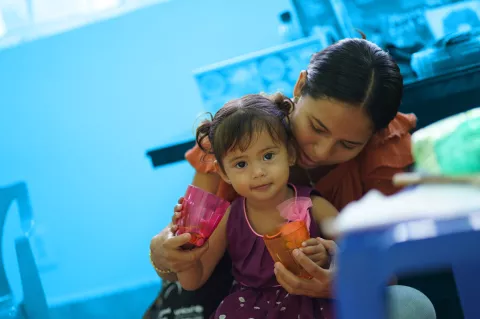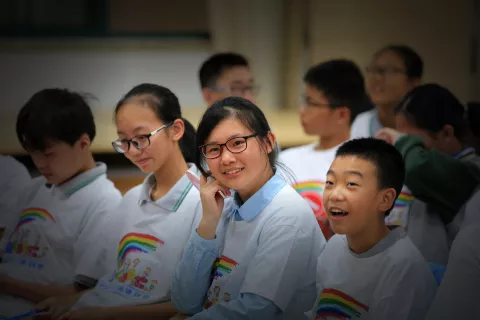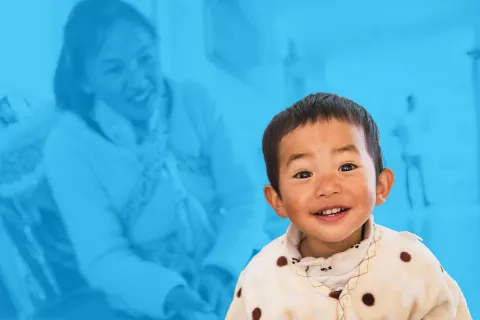#StrongerMindStrongerYou
Helping young people break the silence and end stigma around mental health

- Available in:
- 中文
- English
Mental health and well-being of adolescents is critical for fostering individuals as they transition from childhood to adulthood. This transition lays the foundation for healthy and productive lives. An estimated 13 per cent of adolescents aged 10-19 live with a diagnosed mental disorder globally. UNICEF is working with adolescents to start new conversations around mental health, and help them end the stigma that often surrounds it. Read more about what adolescents, their parents, their teachers, and everyone else can do to support mental health.
Break the silence – end the stigma
Adolescents can help each other – with support from UNICEF, a group of young people rewrote the lyrics of the 1980s hit song Brother Louie by German band Modern Talking, to help tackle stigma around mental health, and support other young people experiencing difficulties.
Watch a bonus video to go behind the scenes of the song creation
“Mental health is widely stigmatized and misunderstood: It is, in fact, a positive state of well-being and a foundation that allows children and young people to build their futures.”
– The State of the World’s Children 2021
We are here for you
Sometimes we all need some extra support
It’s OK to ask for help. To find additional support, call:
- 12355: A toll-free hotline that provides professional mental health and legal support to adolescents.
- 12320: A toll-free hotline that provides public health counselling, including mental health support.
“Mental health is a basic right and essential for achieving global objectives, including the Sustainable Development Goals.”
– The State of the World’s Children 2021

Harnessing the uplifting power of music
Go behind the scenes of our mental health music video shoot.
> Watch a bonus video to go behind the scenes of the song creation
The New York Times for Kids: China, we visit a different Chinese school and invite kids to express their opinions on different social issues. This month we partnered with the United Nations Children’s Fund (UNICEF) and invited adolescents from China, Romania and India to participate in a Pen Pal Initiative.
“When we ignore the mental health of children, we undercut their capacity to learn, work, build meaningful relationships and contribute to the world. When we ignore the mental health of parents and caregivers, we fail to support them to nurture and care for their children to the best of their ability. And when we ignore mental health issues in our societies, we close off conversation, reinforce stigma and prevent children and caregivers from seeking the help they need.”
– The State of the World’s Children 2021
Watch and learn about mental health
“Around the world, mental disorders are a significant and often ignored cause of suffering that interfere with children’s and young people’s health and education and their ability to reach their full potential.”
– The State of the World’s Children 2021
- It is estimated that more than 13 per cent of adolescents aged 10–19 live with a diagnosed mental disorder as defined by the World Health Organization.
- This represents 86 million adolescents aged 15–19 and 80 million adolescents aged 10–14.
- 77 million adolescent girls aged 10–19 and 89 million adolescent boys aged 10–19 live with a mental disorder.
- Anxiety and depression make up about 40 per cent of these diagnosed mental disorders; the others include attention deficit/hyperactivity disorder, conduct disorder, intellectual disability, bipolar disorder, eating disorders, autism, schizophrenia and a group of personality disorders.
- An estimated 45,800 adolescents die from suicide each year, or more than 1 person every 11 minutes.
- Suicide is the fifth most preventable cause of death for adolescents aged 10–19; for adolescent girls and boys aged 15–19 it is the fourth most common cause of death, after road injury, tuberculosis and interpersonal violence. For girls aged 15–19 it is the third most common cause of death, and for boys it is the fourth.
For more information, find the full report: The State of the World’s Children 2021: On My Mind: Promoting, protecting and caring for children’s mental health















